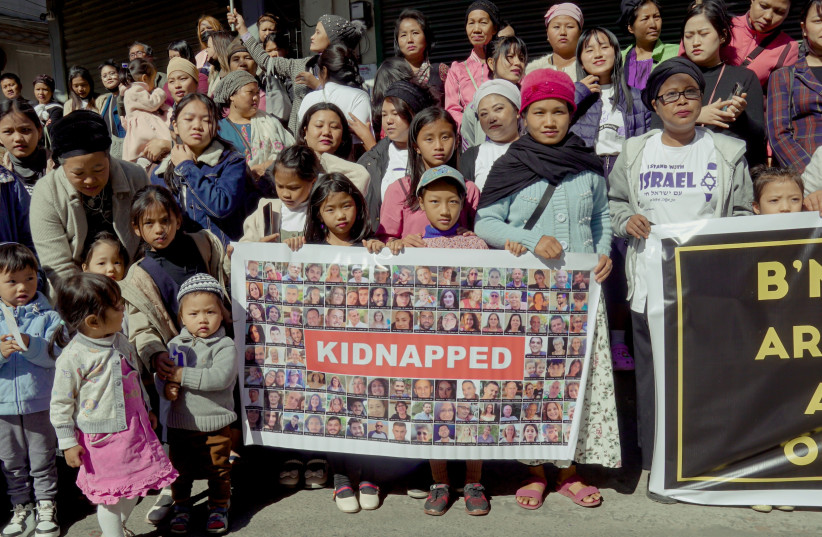BRUSSELS, Belgium – Foreign Minister Israel Katz addressed the European Union Foreign Ministers Council in Brussels on Monday to discuss two main issues; return of hostages and Israeli security.
Displaying photographs, he urged the need to “bringing back home our hostages, including young baby Kfir Bibas (one last week) and these four young women – you can see them in the picture before and after what they (Hamas) did to them. So clearly, it’s urgent and very important to bring them back soon,” stressed Katz.
The second topic for discussion, noted the minister, was restoring Israel’s security after the October 7 Hamas attack, especially to the communities in the south.
Katz is the first Israeli foreign minister to address the EU’s foreign affairs council since Yair Lapid traveled to Brussels in July 2021. Former foreign minister Eli Cohen met with senior EU officials and with EU’s foreign affairs chief Josep Borrell last May to mend ties but did not address the council.
October 7 and the war against Hamas
Opening his remarks at the European Foreign Ministers’ Council, Katz expressed gratitude for the support and solidarity Israel has received from the EU and its member states. He hailed specifically the resolution adopted last week by the European Parliament in Strasbourg, conditioning any ceasefire in Gaza on the dismantling of Hamas and the return of the hostages held in the Strip – a position similar to that of Israel.
Katz also said, “We are in a global battle against radical Islam, led by Iran and its proxies, targeting Israel, our Arab allies, and the broader free world, including Europe. Israel stands at the forefront of this fight.”
Addressing the 'day after,' Katz told the European ministers, “Our goal is clear: the demilitarization and stabilization of Gaza, with Israel maintaining security control to protect our people. Achieving this will open doors to new regional opportunities, allowing us to foster economic and humanitarian initiatives that benefit everyone, including the people of Gaza.”

With that, Katz showed the ministers a short video clip reflecting his vision for Israel and the Middle East. The clip depicted two projects Katz has been advancing for several years now, mainly in his capacities as transportation minister and energy minister.
The first is for the establishment of a Middle East railway connecting Israel to Jordan, Saudi Arabia, Bahrain, and the Emirates. The second is for the construction of an artificial island off Gazan shores. Such an island could harbor a maritime port, an airport, a desalination plant, and an industrial zone.
Katz stressed that rehabilitating Gaza can only come after Hamas is eliminated and Israeli hostages held in Gaza are freed.
The Katz visit comes against the backdrop of harsh criticism leveled at Israel by Borrell. The European commissioner said Monday morning, before Katz’s speech, that the sides must return to discussing Palestinian statehood. “We have to stop talking about peace and start talking more concretely about the two-state solution. Because peace could take many forms. What kind of peace are we talking about? So let’s talk about what we want to do. And what we want to do is to build a two-state solution,” said Borrell.
In the past few days, Borrell reiterated his position that the international community must impose a solution to the Israel-Hamas conflict as the warring sides are unable to come to terms. On January 3, Borrell said “I believe that we have learned in these 30 years that the solution has to be imposed from outside because the two parties will never be able to reach an agreement,” warning that “if this tragedy doesn’t end soon, the entire Middle East might end up in flames.”
Opinions on imposing a solution
The majority of the EU member countries do not believe that a solution should be imposed on the two sides. Still, France has been increasingly calling for a humanitarian ceasefire that should lead to a full ceasefire and the ending of the war to spare the lives of civilians. After addressing the council, Katz is expected to hold bilateral meetings with 10 to 12 European foreign ministers, including with France’s newly-appointed Stéphane Séjourné.
The European Council invited not only Katz to this monthly meeting, but also the Palestinian, Jordanian, and Egyptian foreign ministers. No meetings are expected between Katz and any of these ministers, and they will not be in the same room when each addresses the Council.
The European Union is also meeting with Egypt Tuesday in its association council – the framework for relations between the sides – celebrating 20 years to this agreement. In the meeting between Cohen and Borrell last May, Israel and the European Union agreed they would resume their association council meetings, frozen for the past decade.
